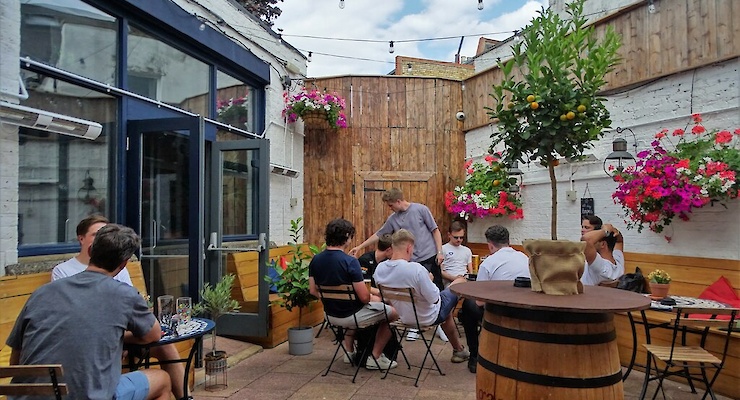


Mortgage Advisor & Director

Head of Bridging and Commercial

If you’re looking to realise your dream of becoming a pub landlord, you’ll need to think about the location, type and style of public house you want to buy. But equally as important, you’ll need to consider how you’ll finance the purchase.
Here we look at how to get a mortgage to buy a pub and how at Teito, we can help you to choose the most suitable finance option for your needs.
Can you use a mortgage to buy a pub?
Yes you can use a mortgage to buy a pub, but the type of mortgage you need will depend on the type of property. Many public houses have residential areas, which are often occupied by the owner, or rented out as hotel rooms.
Either way, this would constitute mixed use, meaning you’d need a semi-commercial mortgage if you plan to live in the property, or a lender flexible to provide a mixed-use commercial mortgage, if you plan to host guests overnight.
It’s important to note that commercial mortgages aren’t regulated by the FCA (Financial Conduct Authority) and semi-commercial mortgages are only regulated when more than 40% of the property is for private residential, which won’t apply to most public houses.
However, this does allow lenders greater flexibility when it comes to calculating affordability.
How much can you borrow?
This will depend on a wide range of factors, including how much deposit you have and whether you’re also planning to use other assets to secure your borrowing. Commercial finance is bespoke to the borrower and based on the lender’s perceived risk of the investment.
As with any mortgage, you’ll need to meet a range of eligibility criteria, all of which can impact the size of your loan. Ultimately, however, you can expect to borrow up to 70% of the cost, while riskier applications may only be able to borrow 50%.
When assessing affordability, your lender will review the pub’s projected earnings before interest, taxes, depreciation, and amortisation (EBITDA) to ensure your operating profit is healthy and sustainable enough to cover the mortgage payments.
Eligibility criteria
The eligibility criteria for a public house mortgage is as follows:
- Experience - The majority of lenders will be looking for previous experience of being a pub landlord (usually a minimum of 2-3 years), whether that’s of your own establishment, or in a management position for another company.
- Deposit - A pub mortgage is likely to need a slightly higher deposit than the average commercial mortgage, as they are seen as riskier than some industries. This means you’ll usually need around 30-45%, depending on the lender and your business and personal circumstances.
- Financial and credit history - Lenders will look into both of these for the business as well as any director(s). The most attractive rates will be available to those with stronger credit history and finances, however, it’s possible to arrange bad credit commercial lending on a case-by-case basis.
- Business plan - The strength of your business plan will make or break a commercial mortgage application. You should include projected profits and how you plan to repay the mortgage, as well as demonstrating your industry experience and business goals.
- Licensing requirements - All public houses will require licensing in order to operate them, so it’s important that you have researched and have all of the necessary certification in place before you apply.
- Specific to the property - Lenders will look at the location and state of repair of the pub as well as whether it’s leasehold or freehold - as this can impact the resale value. They will also be interested in previous performance of the pub (assuming it operated as such previously), including its trading accounts, reputation and local demand.
How to get a pub mortgage
It can be difficult to get a commercial mortgage, there are many complexities involved depending on the industry and intended use or mixed uses of the property. In order to improve your chance of successfully securing a pub mortgage, it’s a good idea to speak to a broker with experience in commercial investment mortgages.
Reach out to Teito below and let us help you to secure the right type of commercial investment finance to purchase a public house.

Connect with a pub mortgage expert today
Available lenders and rates
There tend to be fewer commercial lenders offering pub mortgages than in other sectors, as pubs are considered fairly high risk investments. This means that high street lenders are unlikely to provide too many options, however, there are a host of specialist lenders who are happy to finance pub purchase and remortgages.
Commercial mortgage rates are not typically advertised due to the bespoke nature of this form of finance. However, they are almost exclusively higher than residential mortgage rates and determined by the LTV, strength of the investment and your experience in the pub sector.
Speak to a broker to find out what kind of rate you will qualify for.
Things to consider
Owning and operating a pub entails a number of considerations that will impact both the viability of your business, and your suitability for commercial finance. Some examples are:
Licensing
If you plan to operate a public house, you’ll need both a personal and a premises licence. You may also need a permit from the local authority if you’re planning to host gambling machines. Licencing restrictions such as opening hours and live performance potential are important considerations when choosing a property.
This is because most venues that already operate as a pub will have a licence in place, meaning it’s unlikely the local authority will consider wildly different restrictions. It’s, therefore, important that any current premises licence suits your intended business plan.
Leasehold or freehold
Anyone purchasing property should consider the status of the property, as leasehold properties often have a lower resale potential than freehold properties due to restrictions in the lease. That said, most pubs in the UK are leasehold - with a typical lease being 10-25 years.
When it comes to public houses, leases may include restrictions concerning the operation of the pub. This usually includes which types of alcohol can be sold, and where it can be purchased from. Many leasehold pubs are tied (which means they operate under a specific brewery).
If you purchase a freehold pub, (or freehouse) you own it outright and there are no restrictions or ties to a specific brewery. However, these will usually have a higher purchase cost - although also a greater resale potential.
Why choose Teito for your pub mortgage?
At Teito, we’ve helped many people like you to find the best deal for their pub mortgage. We have access to more than 20,000 mortgage deals, including some from lenders who specialise in financing and refinancing public houses.
Our team of commercial mortgage experts can offer:
- A free, no obligation initial consultation
- Impartial and straightforward commercial investment finance advice
- Exclusive rates and deals for commercial investors
- Service that’s rated 5 stars by Google and TrustPilot
Ready to take advantage of a free, no-obligation chat with a broker who specialises in pub mortgages to find out what your options are? Get started here.
FAQs
You can, but not all lenders will approve this type of mortgage. Pubs are known for causing unwanted neighbourhood noise and nuisance, which reduces the resale value of residential property that are next to, above or opposite pubs and similar entertainment establishments.
You may need a specialist lender if you plan to live next door to a pub, as they tend to have more flexible criteria than high street lenders. If you wanted to buy a pub that you were also planning to live in, for example, a pub with a flat above, you could also consider a semi-commercial mortgage.
Choosing an Adviser
Selecting a qualified and experienced mortgage adviser is of great importance. To choose a suitable adviser, evaluate their qualifications, experience, and reputation, and ensure they are regulated by the Financial Conduct Authority (FCA).
Read reviews from previous clients and make sure they provide a clear explanation of the products and services they offer, as well as the fees and charges associated with them.

























































































































































